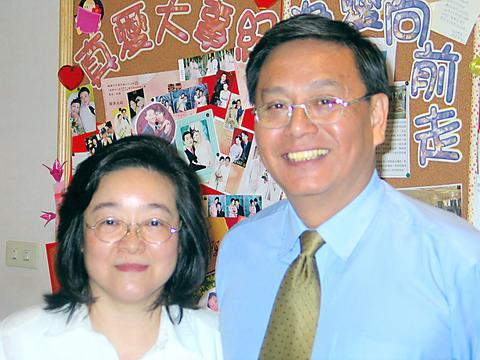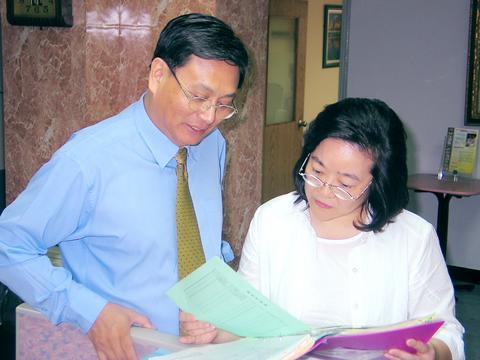Searching for a soul mate when you're 20 is hopelessly romantic, but when you're still searching at 30 it can feel just hopeless. So how much would you pay to have someone do it for you? Is NT$25, 000 a year too much?
Lily Jan, or Mama Jan (

PHOTO: DIANA FREUNDL, TAIPEI TIMES
Five years ago, Jan turned her talent into profit with the Taiwan-based matchmaking agency, Super Matchmaker Mama Jan (姻緣專家詹媽媽). Although she holds a degree in foreign languages from National Taiwan University, she put her academic career on hold to become a modern day cupid.

Matchmaking in Chinese society can be traced to the Song dynasty when marriages were arranged between the parents of the prospective bride and groom, along with the help of a go-between. The matchmaker's main responsibilities included making sure the young man and woman were suitably matched and negotiating the dowry.
For the Jan's, it began as a family business in 1954 when Granny Jan (Mama Jan's mother-in-law) introduced a classmate to an employee in her father's company. It was a meeting that led to marriage and an informal business for Granny. Four decades later with the help of her son James (Papa) Jan, (詹謙益) and his wife, Mama Jan, the family enterprise expanded into a licensed company.
Now, with more than 6,000 single candidates on their roster and six branches nation-wide, it is arguably the largest of its kind in Taiwan. "There are thousands of organized dating agencies in the country but few are focused exclusively on marriage. We're not about meeting people and making friends. One hundred percent of the people who come to us come because they want to get married," Jan said.
The clients are between 26 to 35 years of age. In contrast to other agencies, most of them are women. The reason for this, Jan said, is because "we are very selective about the men we accept."
They don't discriminate against race, religion or cultural background, but if anyone without a steady income or a strong educational background applies they will likely be turned away. "We're a white-collar organization. The people who register with us are intelligent men and women. Our requirements are good education and a steady income. And if we don't think we can find someone a match, then we don't want to take their money," she said.
The dim and jobless are not the only castaways. Jan said if she or any of her employees has qualms about an individual's "character," then that candidate will be politely rejected. "It's difficult to determine if someone has a violent history from an application form, so if we're unsure it's better to be safe."
After the preliminary background check to verify a person has a job and is not married, or a psychopath, the next stage is a face-to-face consultation. This is where candidates are encouraged to be as specific as possible about the qualities they're looking for in a potential partner. Perhaps to guard against any future family strife down the road, parents will often attend this meeting.
The only applicants who are not required to meet in person with a company employee are the 50-plus Taiwanese candidates living in the US. The increase of overseas clients in the past two years has led to the Jan's decision to open a US branch based in California.
Once a person's details are logged, then the matching begins. The first thing they look at is age, then height, followed by occupation. Height is a discriminating factor because almost all of our female applicants say the man must be taller, and the taller he is the better, Jan said. Zodiac signs, blood types and other such beliefs are used as reference tools, but are not crucial, unless specified by a client.
After a potential match is made, the couple is invited on a chaperoned date at one of the centers, where hundreds of prospective spouses meet every weekend. Jan said it takes an average of 15 to 20 meetings to find the right person -- apart from the occasional love at first sight, or "matches made in heaven," as she referred to them.
As far as matches made in hell, there haven't been any, she said. Of the 2,000 successful matches made to date, there are only four known divorces.
They might not be bombarded by complaints but there is no shortage of requests. The most common is women who want to marry doctors. The most specific request was made by a district attorney who brought in a photo of a Taiwanese actress and said, "This is my type, but she must be under 30 [years of age]."
"I told him he should be more realistic, but he just said,"I'll wait."
Eight years later, he's still waiting.
With their hefty annual membership fee, six branches and plans to expand to the US, the Jan's have made a lucrative business out of love. But they're sure to insist that money is not what's important.
"Actually money is not our first concern. If we feel someone is a good person, then we want to help them find the right partner and we usually won't ask them to pay a membership fee every year," Jan said.
Super Matching by Mama Jan is available to all residents in Taiwan, provided they have a job. For more information in Chinese, check online at www.mamajan.com.tw, or call (02) 8773 5233 and speak to Mama or Papa Jan.

In the March 9 edition of the Taipei Times a piece by Ninon Godefroy ran with the headine “The quiet, gentle rhythm of Taiwan.” It started with the line “Taiwan is a small, humble place. There is no Eiffel Tower, no pyramids — no singular attraction that draws the world’s attention.” I laughed out loud at that. This was out of no disrespect for the author or the piece, which made some interesting analogies and good points about how both Din Tai Fung’s and Taiwan Semiconductor Manufacturing Co’s (TSMC, 台積電) meticulous attention to detail and quality are not quite up to

April 28 to May 4 During the Japanese colonial era, a city’s “first” high school typically served Japanese students, while Taiwanese attended the “second” high school. Only in Taichung was this reversed. That’s because when Taichung First High School opened its doors on May 1, 1915 to serve Taiwanese students who were previously barred from secondary education, it was the only high school in town. Former principal Hideo Azukisawa threatened to quit when the government in 1922 attempted to transfer the “first” designation to a new local high school for Japanese students, leading to this unusual situation. Prior to the Taichung First

Chinese Nationalist Party (KMT) Chairman Eric Chu (朱立倫) hatched a bold plan to charge forward and seize the initiative when he held a protest in front of the Taipei City Prosecutors’ Office. Though risky, because illegal, its success would help tackle at least six problems facing both himself and the KMT. What he did not see coming was Taipei Mayor Chiang Wan-an (將萬安) tripping him up out of the gate. In spite of Chu being the most consequential and successful KMT chairman since the early 2010s — arguably saving the party from financial ruin and restoring its electoral viability —

The Ministry of Education last month proposed a nationwide ban on mobile devices in schools, aiming to curb concerns over student phone addiction. Under the revised regulation, which will take effect in August, teachers and schools will be required to collect mobile devices — including phones, laptops and wearables devices — for safekeeping during school hours, unless they are being used for educational purposes. For Chang Fong-ching (張鳳琴), the ban will have a positive impact. “It’s a good move,” says the professor in the department of